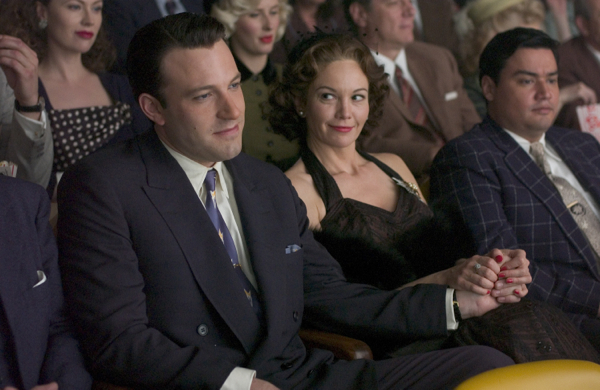Movie review by Greg Carlson
Structured like “Citizen Kane” meets “Rashomon, ” “Hollywoodland” speculates on the death of actor George Reeves, who played the Man of Steel on television from 1952 to 1958 (following an appearance in the low-budget quickie “Superman and the Mole-Men”). For generations of grade-school kids, Reeves’ demise has been the subject of speculative urban legends, from the notion that mental instability convinced the actor that he could fly like the character he portrayed to the equally unlikely claim that he believed bullets would bounce off his body. “Hollywoodland” suggests several scenarios – ranging from accidental murder to calculated hit – but the one that makes the most sense is the official version: a depressed Reeves took his own life.
“Hollywoodland” hedges its bets by tracking both George Reeves (Ben Affleck) and a private investigator named Louis Simo (Adrien Brody), who is trying to piece together the facts of what appears to be a conspiracy. Sewn together like a crazy quilt, first-time screenwriter Paul Bernbaum’s script spends a great deal more time than it should contemplating the emotional troubles of the Simo character, when the Reeves storylines are infinitely more compelling and worthwhile. A rickety subplot involving Simo’s estranged wife and son doesn’t do the movie’s pacing any favors either.
Whenever the film takes up with Reeves, it sputters to life. Affleck makes a strong impression as the frustrated TV star, whose relationship with Toni Mannix (Diane Lane), the married wife of a thuggish studio executive (Bob Hoskins), provides the central focus of the flashbacks. As suggested in “Hollywoodland,” Reeves resents being a “kept man,” as the wealthy Mannix – engaged in a very open marriage – buys Reeves lavish gifts, including a rather nice house. As Reeves begins to think that his inability to find film roles has as much to do with Toni’s wishes as it does with his inseparable identification with the Superman role, “Hollywoodland” invents a number of fictitious flashpoints, the most intriguing of which is a test-screening of “From Here to Eternity” that results in Reeves being left on the cutting room floor because the audience can’t stop cracking wise (digital magic places Affleck in the same frame as Burt Lancaster, which will intrigue many film buffs).
Another of the too-good-to-be-true anecdotes revolves around a child who pulls a loaded handgun on Reeves during a public Superman appearance. While stories of surly brats testing the actor’s “powers” have become a well-oiled aspect of the Reeves legend, the veracity of the scene remains suspect. Even so, it makes for a cinematic moment – a point not lost on M. Night Shyamalan, who used the idea in “Unbreakable.” In or out of the blue tights and red cape, Affleck brings a weary dignity to Reeves, showing us a man who tried to accept his fate with as much cheer and good humor as he could muster.
First time feature director Allen Coulter (a veteran of a number of HBO series, including “The Sopranos” and “Six Feet Under”) approaches the material in a workmanlike fashion, and the result occasionally feels as suited to cable television as it does to theatrical distribution. The supporting roles are filled by terrific performers (Jeffrey DeMunn, as Reeves’ agent is a standout). Smartly, the movie mostly avoids milking the far-fetched possibilities surrounding the man who gave birth to the “Superman curse,” settling instead on the human elements of a broken tinseltown dream.
